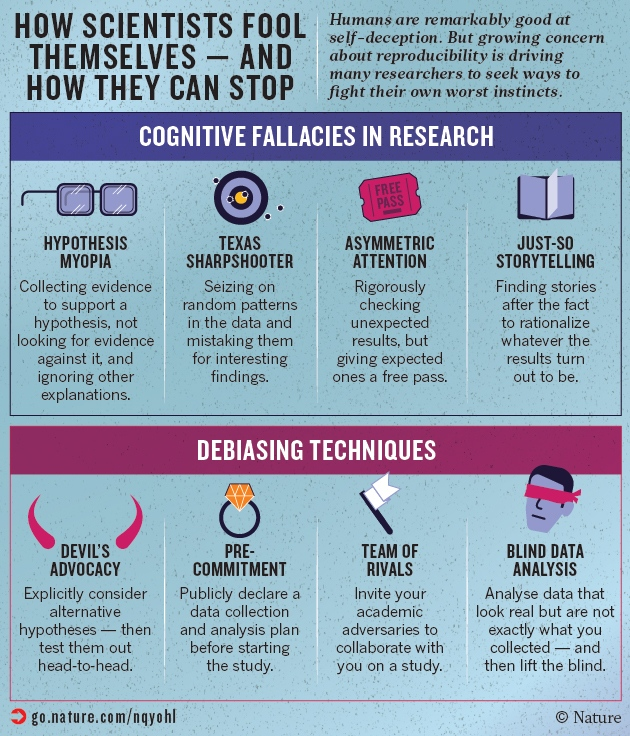
Source: Nature
How Scientists Fool Themselves
October 14, 2015 4:30pm by Barry Ritholtz
This content, which contains security-related opinions and/or information, is provided for informational purposes only and should not be relied upon in any manner as professional advice, or an endorsement of any practices, products or services. There can be no guarantees or assurances that the views expressed here will be applicable for any particular facts or circumstances, and should not be relied upon in any manner. You should consult your own advisers as to legal, business, tax, and other related matters concerning any investment. The commentary in this “post” (including any related blog, podcasts, videos, and social media) reflects the personal opinions, viewpoints, and analyses of the Ritholtz Wealth Management employees providing such comments, and should not be regarded the views of Ritholtz Wealth Management LLC. or its respective affiliates or as a description of advisory services provided by Ritholtz Wealth Management or performance returns of any Ritholtz Wealth Management Investments client. References to any securities or digital assets, or performance data, are for illustrative purposes only and do not constitute an investment recommendation or offer to provide investment advisory services. Charts and graphs provided within are for informational purposes solely and should not be relied upon when making any investment decision. Past performance is not indicative of future results. The content speaks only as of the date indicated. Any projections, estimates, forecasts, targets, prospects, and/or opinions expressed in these materials are subject to change without notice and may differ or be contrary to opinions expressed by others. The Compound Media, Inc., an affiliate of Ritholtz Wealth Management, receives payment from various entities for advertisements in affiliated podcasts, blogs and emails. Inclusion of such advertisements does not constitute or imply endorsement, sponsorship or recommendation thereof, or any affiliation therewith, by the Content Creator or by Ritholtz Wealth Management or any of its employees. Investments in securities involve the risk of loss. For additional advertisement disclaimers see here: https://www.ritholtzwealth.com/advertising-disclaimers Please see disclosures here: https://ritholtzwealth.com/blog-disclosures/
What's been said:
Discussions found on the web:Posted Under
Previous Post
Don’t Suffer From Denominator Blindness

Thesis Anti-thesis Synthesis
First get yourself an endowed Chair and tenure – then follow the chart.
Sadly university scientists are like small businesses and they are competing for that small pot of NIH funds (10% or less of research is actually funded) so the splashier and more dramatic your results the better chance you have. In fact that is the only chance you have- the window for success is very short about 5-7 years. This encourages fraud or looking the other way. It is like the CEO that needs to make his money in the short run with no view to the long term health of a business. After that initial success you have to keep it coming until you find a sugar daddy that will bank roll you. Science and business have become the same over that last 30 years – the guy may have no substance but he is a great salesman. A few get caught but not enough to fix the system.
In a country this big and rich it should be a no brainer to take 3-5% or so of your GDP and invest them in scientific exploration. It is a joke to think that the great discoveries come from competition amongst scientists or that business will fund this. The long term health of our economy would be ensured if we did this. The NIH system of allocating funds to labs is not perfect but the funding levels need to be 30 -50% of grants submitted and not the current 10% or less.
can we talk to about their addiction to p-value or whatever model they learned in grad school as the ONLY right way to test a hypothesis. I hate dealing with PhDs.